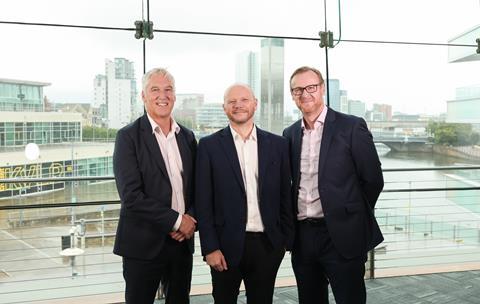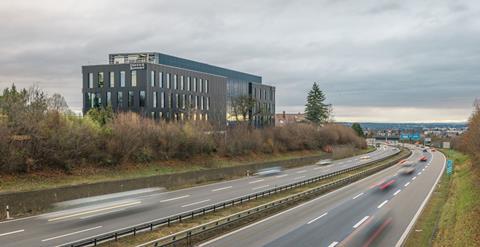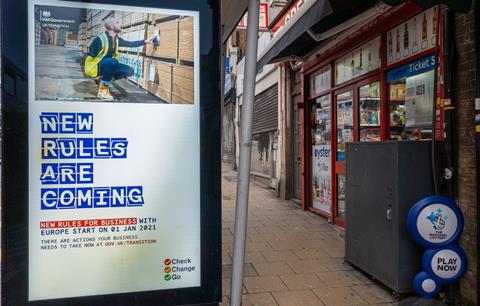The apology is already half-formed in Kenneth Wood’s mouth as he bursts out of the meeting room in Drees & Sommer UK’s London office. It’s a tax thing. Something to do with a prospective acquisition in the United States. He’ll be with us in a moment.
Building’s reporter uses the extra time to scribble out another question in his notebook: “Any more acquisitions planned?”
After all, when we meet in the firm’s modest quarters in Holborn, it has only been a few days since the consultant announced its purchase of Northern Irish rival Johnston Houston.
When Wood eventually extricates himself from the lawyers, he explains that the aforementioned American deal is still a fair way off. But there is plenty of business to be done before that.
Their Dublin office opens within the next month and they are eyeing up an acquisition in Scotland. “More on that in about three months’ time,” Wood teases.
The story behind this ambitious expansion goes back to the acquisition of the British business itself, which had been run as an independent firm under the name AA Projects until 2022, when it was bought by the German giant whose name it now bears.
Wood has been managing director at the business, established in 1999, for more than seven years. In 2018, he and nine others in the team completed a management buyout of the firm, and the years that followed saw its turnover double.
By 2021, they felt they were ready for their next stage of growth and were exploring options that would allow the business to expand internationally into Canada and the Nordics.
According to Wood, they were not short of suitors. “There must be a certain size that you hit where private equity suddenly takes an interest in you,” he says. “And we got approaches from a lot of big competitors about acquiring us as well.”

Neil Fyles, director at Drees & Sommer UK, adds at this point that the latter of these “didn’t really float our boat… Some of the big US engineering-led type businesses approached us,” he says. “One was quite persistent, came back two or three times and we kept saying no”.
Fyles is a veteran of Davis Langdon and says his experience of that firm’s acquistition by Aecom influenced his perspective as AA Projects considered offers from private equity and large publicly-traded corporates. Fyles joined AA Projects in 2012: “I didn’t leave Aecom to go back to that,” he says.
“In a New York Stock Exchange business, you become completely governed and ruled by what that business is reporting to the stock exchange on Monday morning. It’s less about the people, it’s less about the clients, it’s more about profitability.”
Of more interest to AA Projects’ leadership was the private equity option. A soft market test yielded one option that the partners were “really comfortable with”, which would have seen investors take a minority shareholding.
Then came a meeting with Michel de Haan, then a director at Drees & Sommer. The two firms had recently collaborated on a scheme in Copenhagen and the meeting, ostensibly about how they could work together in the future, quickly snowballed. “He took 32 minutes to make us an offer,” recalls Wood.
After another meeting with Drees & Sommer (D&S) leadership and an emergency directors meeting in September 2021, they decided to pause the private equity for a month, by the end of which they had signed initial exclusivity to D&S for three months.
In an ideal world, what we did with our MBO, we would probably have liked to replicate that at some point in time… but it would have just been unaffordable
Neil Fyles, director, Drees & Sommer
What followed was a back and forth over legals, interviews in Stuttgart, and negotiating over the structure of the deal, which would see the German company initially become a shareholder, with a drag-along right on the remaining share in the business.
The advanced state of the planned private equity deal meant that AA Projects was well prepared for this process, and the deal was completed by March 2022. But why choose Drees & Sommer over a private equity deal already on its way towards completion? On one level, the reasons for the decision were simple.
“The price was right, to be really honest,” says Wood. But he also stresses that the ownership offer “turned the risk profile down a lot” for the AA Project partners personally, while maintaining a greater degree of ownership than the aforementioned offers from listed firms, with Wood and Fyles becoming equity partners of Drees & Sommer as part of the deal.
Wood and Fyles say this path to ownership remains open for employees of the British business, something they were always concerned about when considering new investment.
“In an ideal world, what we did with our MBO, we would probably have liked to replicate that at some point in time,” says Fyles. “[But] I think because of the growth we had gone through and the size that we were, it would have just been unaffordable.”
Beyond that, the two firms were compatible in what they wanted to achieve from the deal strategically. For AA Projects, they wanted to expand and D&S could support that, without too many complications in terms of merging teams.

The German firm had only around 25 staff in London and Kent at that time, mostly operating in different sectors from AA Projects.
“The fact that the business, while it was strong in Europe, didn’t have a big name in the UK, could be seen as a disadvantage, but it helped from a personnel point of view,” says Fyles. “Even the people who were here, there was no conflict with what we were doing already”.
D&S, for its part, wanted to become a more international business in a fundamental sense, and saw the British business as a way of getting a foothold into markets it had always struggled to crack.
>> Also read: Solving the industry’s green problem: inside Drees & Sommer’s new energy-plus HQ
“The business has a very impressive international client base,” says Wood. “If we don’t follow those clients internationally, someone else is going to work for them”.
But the differences in culture, market composition, and construction and consulting traditions had made it difficult for the German business to make progress in the UK, as well as foreign markets that had inherited British traditions.
“They were struggling to break the British client barriers down,” says Fyles. “Even those US, Middle East, even Far East clients investing into Europe had a greater affinity, because of historical links, to that UK approach, rather than a Germanic approach”.
As the only Englishman in a board room full of Germans (and one Swiss-German), Wood provides an invaluable role as a kind of Anglo-whisperer. “You get called an Anglo-Saxon all the time,” he says. “I feel like I should have a sword and a helmet”.
In his first partners meeting, Wood pulled out a map and explained in broken German (he is now a B2 level speaker), the very basics of the UK. We are an island. We have lots of ports. Margaret Thatcher killed off heavy industry in the 1980s.
“The German market isn’t replicated here in the UK,” he explained to them. “We’re a service driven country, not an industrial driven country. But we do have things around ports and defence”.

Becoming a Drees & Sommer business has meant a change in the kind of work the British operation has taken on. “Part of the opportunity for us in the UK is to build on that German heritage, and the opportunity that brings in what we would call the industrial cluster,” says Fyles.
They have started servicing some of the clients of the German business’ needs in Britain, while domestic clients in more industrial sectors in the UK have started taking more interest. “We’ve won stuff we know we wouldn’t have won before,” says Wood.
Because of non-disclosure agreements, he is cagey on what exactly falls into this category, however. Drees & Sommer told Building its current client list includes BMW, Siemens Energy, the UK Parliament and the universities of Cambridge and Oxford. Services for each of these are multidisciplinary in some instances and include cost management, project management, strategic management and net zero consultancy.
But it’s not all change, with staff able to choose how much they get involved in this new work. “We joke that, if you want to carry on working on your new school project in Preston, carry on,” says Wood. “We’re not rushing into anything at all, we are doing it bit by bit”.
The period of partial ownership was meant to last for two years, but after discussions in December 2022, they decided to progress more quickly and Drees & Sommer took full ownership in March 2023. A year later, the AA Projects moniker was officially removed from branding.
“It was almost like you date, you get engaged, you get married,” says Wood. “You work your way through the engagement process. We speeded up the engagement period.”
The combined UK business now has a headcount of 217, with offices in Liverpool, Leeds, Birmingham, Oxford, London, Ashford, Belfast and Manchester, where it has its headquarters.
We are not just going around hoovering things up. We are doing strategic M&As linked with organic growth as well
Kenneth Wood, managing director, Drees & Sommer UK
They recently hosted a large group of their German colleagues in their home city for the first time, giving them the full Mancunian built environment experience with a showy property event at the Kimpton Clocktower Hotel and a trip up the Beetham Tower.
It hasn’t all been smooth sailing, however. Becoming a European business in the post-Brexit era has been a challenge. “We have been trying to move a particular senior individual from the UK into the EU [and] you would not believe how difficult it is,” says Wood, who adds that his main ask of the government is that they “open the doors a bit more”.
The business has also faced barriers introducing Drees & Sommer’s profit participation rights policy, with potential participants risking dual taxation issues. “You do feel a bit like you have got one foot out of the camp,” he adds.
But these European troubles have not allayed the business’ planned expansion into the Republic of Ireland, which Woods says will come from an organic growth of the business rather than an acquisition.
They have been sounding out clients for a while and Wood says the Northern Irish purchase will help them, as Michael Johnston is Irish. His business partner Kerr Houston, on the other hand, is Scottish, which will help them with the next stage of their expansion plan.
“We are sort of using [Johnston and Houston] as a bit of a vehicle for expansion,” says Wood. “We are not just going around hoovering things up. We are doing strategic M&As linked with organic growth as well.”

Wood says he cannot say too much about the potential expansion into North America, as talks are still at an early stage, but he did say that Drees & Sommer was “in negotiations” in the region. “We’re talking to a number of people, to be fair,” he says.
“As a wider business we are looking more over to North America [but] there is obviously nervousness around what is going to happen with Trump and Harris.”
Concerns seem to relate to how welcome foreign firms would be under a second Trump administration, but Wood says a decision on a push into the States would not be taken until after November anyway.
“For us, here, it will be Scotland next, fingers crossed, then we’re looking at other stuff across Europe,” he says. Drees & Sommer already have small offices in Hungary, the Czech Republic, Sweden, Denmark and may look in their own back garden for growth if North America appears too unstable. “I think there’s a habit of looking to Eurppe because its safer,” says Wood.
As far as the prospects for the UK business go, Wood is wary of defining its ambitions by a number. In terms of turnover, it is currently a £30m business (year to December 2023), with an operating profit of £2.4m, but Wood says these are not the terms by which they define themselves.
“I think a fair way of putting it is that we are not looking to be a volume business,” he says. “We are focused on doing the job right for the right price. We are a 15%-plus margin business.”
Whether the firm’s future expansion lies across the Atlantic or on the near side of the North Sea will be revealed in time. But it is clear that wherever they take their business next, Drees & Sommer UK knows what it wants from growth.
